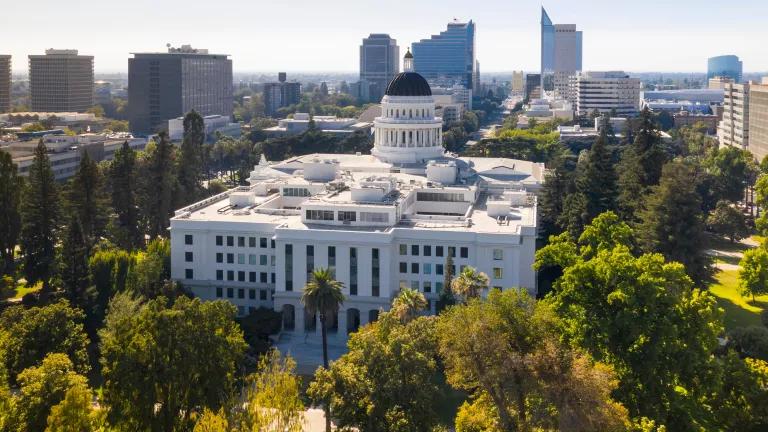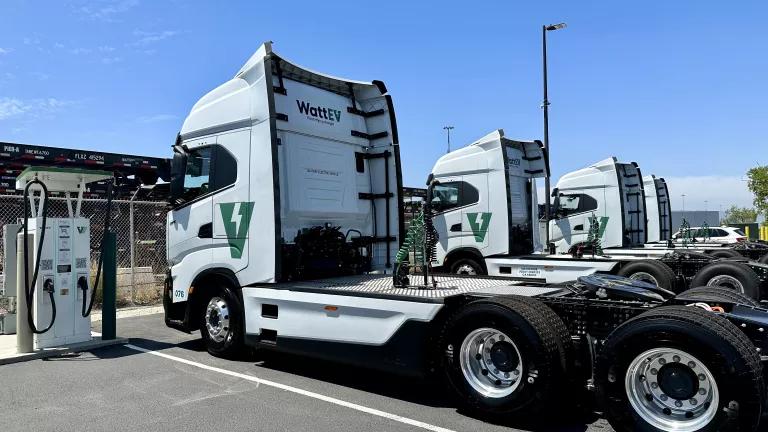Oil Industry Attacks California's Oil Saving Measures Just When Consumers Need Them Most
California consumers were treated to an early Halloween scare this month when retail gasoline prices surged as high as $5 per gallon. This latest spike was largely due to unplanned shutdowns of the ExxonMobil refinery in Torrance, an August explosion at the Chevron refinery in Richmond, and planned maintenance shut-downs by other refineries [see here and here]. While investigations into the causes of the Chevron refinery safety problems remain ongoing, officials have called on the Federal Trade Commission to look into whether price manipulation and deceptive practices within the industry had a hand in the rapid uptick in prices paid at the pump [see here and here].
But in a cynical twist, the oil industry is now trying to divert attention away from the real causes of the gas price spikes – our continued petroleum dependence that leaves us beholden to any supply disruption like the one we just experienced. Instead, the oil industry, represented by the Western States Petroleum Association (WSPA) together with a Chevron funded organization, Fueling California, are now attacking the state’s key policy to reduce oil dependency, cut carbon emissions, and provide consumers more fuel choices.
Increasing Consumer Fuel Choices
California’s groundbreaking Low-Carbon Fuel Standard (LCFS) opens the door for new consumer choices – gasoline and diesel substitutes such as advanced renewable fuels and cleaner electricity. Anybody who believes in more competition in the fuels marketplace should support the LCFS, not fight it.
The oil industry maintains a virtual 95% monopoly on our fuel choices in California. So it’s no surprise that the oil industry is throwing the kitchen sink at ways to roll back the current program aimed at increasing lower carbon fuels and decreasing oil dependency. This kitchen sink includes claims that gasoline prices will rise by falsely assuming that alternative fuels do not exist and cannot be supplied in greater quantities for the next decade. The truth is hundreds of small, medium, and large sized companies throughout the U.S. and in California are currently producing cleaner alternative fuels and technologies.[1]
The oil industry may want to keep expanding drilling, keep selling more gasoline, and keep making record profits. But that does not give them license to escape from pollution requirements, make unfounded claims on the costs and availability of alternative fuels, or ignore job creation from the clean fuels industry and technology supply chain. Nor should they ignore ways to invest to clean up their own operations to produce lower carbon gasoline and diesel. With the oil industry having a firm grip on Washington, it’s critical for California and other states to move forward with policies that deliver more clean fuel choices.
Reducing Consumer Fuel Bills
What the oil industry-funded studies don’t tell you is that California’s oil saving measures, including the Low Carbon Fuel Standard, are saving California consumers and businesses $50 billion over the next decade in fuel costs. That’s nearly $1000 annually per household due to cleaner and more efficient cars, more fuel choices, and improved land-use and transportation options.
Instead the oil industry wants you to believe that the LCFS will cause gasoline price spikes like the one we just experienced. But a quick check on their consultant’s math reveals a make-believe world where the technology costs to reduce emissions are two orders of magnitude (100x) higher than current costs. That is, the oil industry cost scenario is so exaggerated that, if it were true, clean fuel providers would be paying you to take their product.[2] The oil industry’s study has already been debunked here by an alliance of California clean businesses.
The truth is, without policies like the LCFS that drive diversification in our fuel mix, we will remain at the mercy of the next gas price spike. The real answer lies in incentivizing ways to more efficiently use that energy, diversify our fuel choices, and reduce the need to drive. This is too important of an issue for policymakers and consumers to leave to the oil industry to decide.
[1] One example of this is the advanced biofuels industry, where the WSPA funded study by Boston Consulting Group study claims that no advanced biofuels will be available until the next decade. According to a study by Environmental Entrepreneurs, the advanced biofuel industry is well-positioned to produce 1.6 billion-2.6 billion gallons of next-generation cellulosic biofuels over the next several years – enough to more than meet California’s LCFS standards.
[2] The WSPA-funded Boston Consulting Group study implicitly assumes credit prices, or compliance costs to achieve emission reductions, that are thousands of dollars per metric ton reduced. This turns out to be several times the production costs of alternative fuels such as electricity, natural gas, and advanced renewable fuels.




